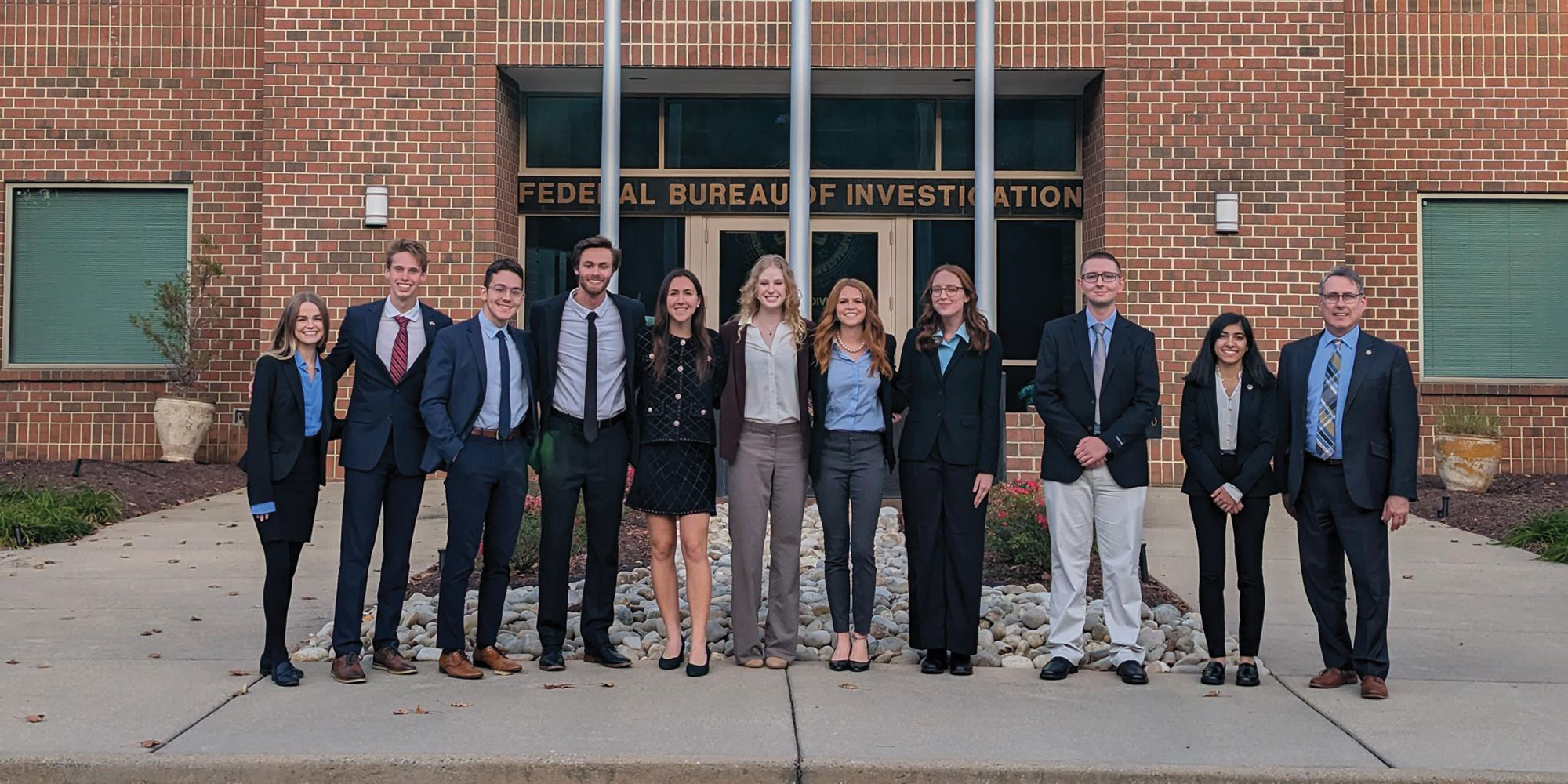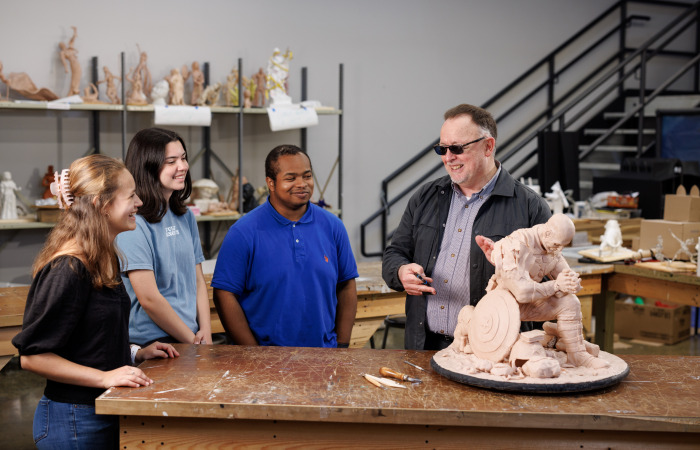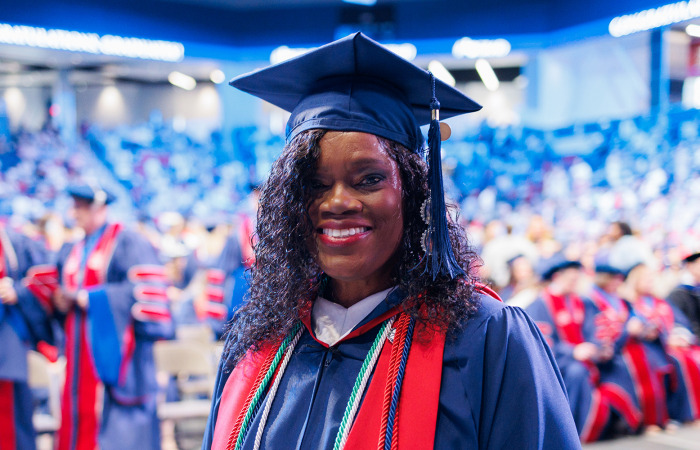Students gain early experience working on projects for Department of Defense, FBI, NATO, and more
Many college students have the opportunity to present projects in class or at conferences, but a group of students at Liberty University are building their résumés — and contributing to America’s defense — by sitting across the table from some of the highest-ranked officials charged with protecting our country.
About 50 students are members of the Liberty University Analytical Support Initiative (LASI), which partners with federal agencies such as the National Security Agency, FBI, NATO, the Joint Chiefs of Staff, and Department of Defense on assigned projects. Students work in teams of about 10, gathering data and conducting research on issues concerning international relations and national security. Projects have ranged from immigration policy to energy infrastructure and terrorist threat risks. The details of their projects are kept strictly confidential.
LASI was started in 2021 by Helms School of Government Associate Professor Scott Roenicke, who retired from a 30-year career at the Pentagon as a Senior Advisor for Russia Affairs to the Chairman of the Joint Chiefs of Staff, in addition to serving as the Director for Russia Affairs at the White House in the National Security Council. Shortly after coming to Liberty, Roenicke was approached by a representative from the Pentagon who asked if Liberty had students capable of completing highly sensitive projects. Soon, the National Security Agency and the FBI came knocking too.
“It’s like (these agencies are) saying, ‘We really have this problem, and we don’t have the manpower to focus because we’re dealing with crises all the time,’” Roenicke said. “(They say) ‘We’d like a deep concerted effort and a focus to be made on this particular topic so that we can sit back when we have a few minutes and hear an informed presentation from your students and then figure out if this is something we need to be concerned with and address in a more coherent and deliberate fashion.’”
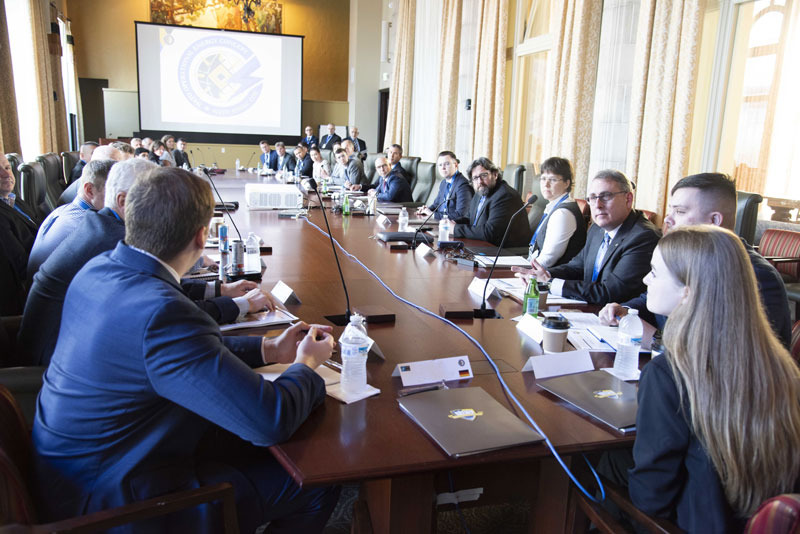
NATO planning conference, Monterey, Calif.
The work has taken members to the Pentagon, across the country, and even internationally.
Over Winter Break, nine Liberty students traveled with Roenicke to Lithuania to meet with officials at the Energy Security NATO Centre of Excellence, which commissioned the students to conduct an independent analysis integral to the security of the U.S. and the NATO Alliance. Students presented their findings, demonstrating the implications that their analytical conclusions would have on Euro-Atlantic security. The centres are international military organizations that train and educate leaders and specialists from NATO member and partner countries. On the trip, students also had the chance to visit historic churches and museums that chronicled the country’s recent history of occupation under Nazi Germany and the Soviet Union and meet with officials at the U.S. Embassy in the capital city of Vilnius.
Roenicke said the students presented “incredibly consequential” work in Lithuania and even engaged the officials in debates and model exercises to explain the concepts of their studies. For their professionalism, NATO officials presented Roenicke and the students with a medal of gratitude.
“I’ve heard from people in the intelligence community that when they are presented the results of our students’ cross-functional analyses, they are extremely impressed by the depth of detail and the complex frameworks that are used,” Roenicke said.
That meeting led to another invitation from the NATO Centre of Excellence to attend its planning session in Monterey, Calif., in February.
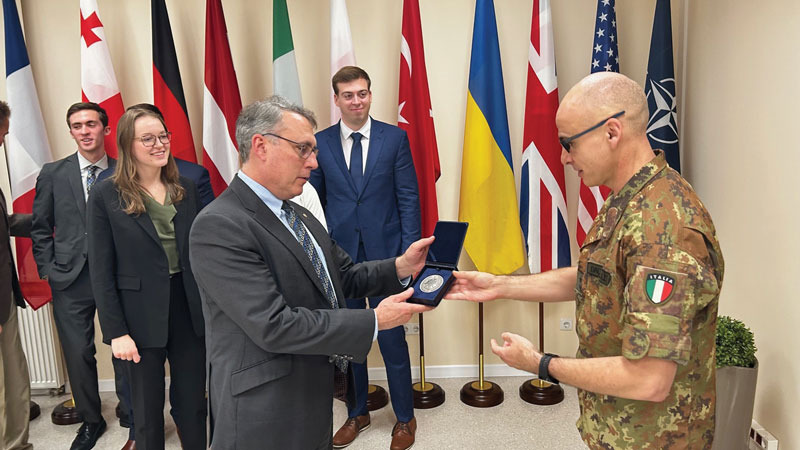
A NATO official presents Scott Roenicke with a medal of gratitude for the students’ work at the Energy Security NATO Centre of Excellence in Lithuania.
Due to the wide range of issues that LASI may be called upon to address, the program welcomes undergraduate and graduate students from various academic programs. This year’s members (mostly undergraduate) came from academic disciplines including government, strategic communication, criminal justice, science, business, psychology, cybersecurity, strategic intelligence, international relations, and divinity.
Although professors are not always directly involved in the projects, they often remain close at hand to suggest avenues for further research or give students additional contacts for assistance in their departments.
Graduate student Kinsey Painter, who earned her master’s in industrial organization psychology in May, served as the deputy team leader in Lithuania and California.
“We were so lucky to have that experience (in Lithuania),” she said. “All of us felt like it was a dream to be able to present our hard work that way, to exemplify Christ in that region and to the people we met, and have that incredible immersive experience.”
As students look to supplement their classwork with real-world experience, one of LASI’s main objectives is to help them integrate their respective disciplines into meaningful and practical work.
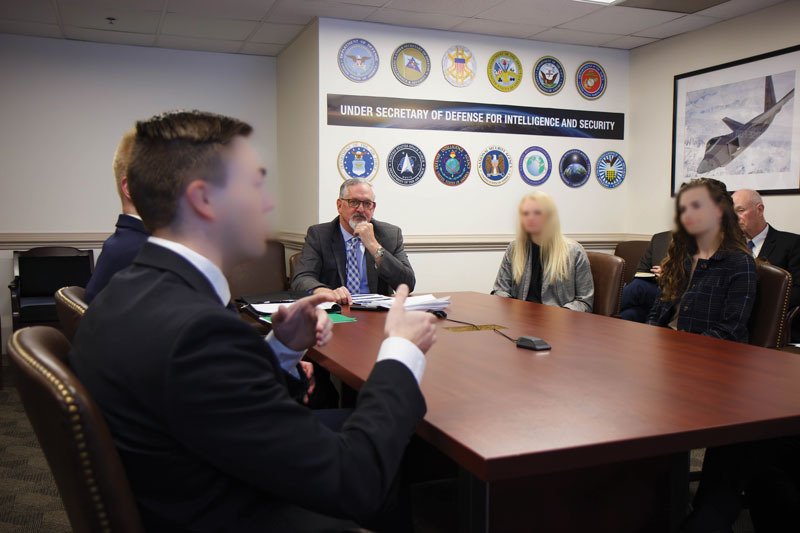
Pentagon, Arlington, Va.
“LASI took that love for research and analysis that I had and tied it to new projects and new topics that I didn’t really have familiarity with from psychology,” Painter said, “such as national security and issues that really matter in the real world. It was able to pair me with things that energized me. It’s probably been my favorite work that I have done in my academic career.”
She said she appreciates the way LASI “connects everybody and allows us to leverage all of our different backgrounds and perspectives in a way that’s unparalleled in the university. Being part of that feels really amazing and incredible.”
Clinton Casey, who graduated with his MBA in May, was in his third semester as a member of LASI in the spring. He has spent over 10 years serving in the U.S. Army and said he originally chose to attend the university because of its emphasis on education from a Christian perspective. As a student, he saw how Liberty students impacted the world for the Kingdom of God.
“For a government entity to reach out to a Christian school and ask their mostly undergrad and some graduate students to work on a real-world problem that usually is reserved for an Ivy League institution, if it even happens at all, is a testament to not only the Christian worldview of the students but God’s favor on Liberty,” he said. “It shows students that we can impact the world as students and after graduation.”
Roenicke said students who have participated in LASI have gone on to accept jobs in the federal government, from the State Department to Department of Defense, Homeland Security, and beyond.
“When you have people who love God and who are working for His glory, He opens up vistas and opportunities that would otherwise not be open.”
